Signalian
PDF THINK TANK: CONSULTANT

- Joined
- Aug 18, 2015
- Messages
- 10,608
- Reaction score
- 305
- Country
- Location
MAJ DR FARAH BILAL
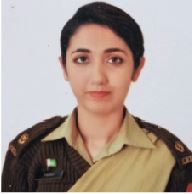
Maj Dr Farah Bilal recounts the challenges, joy and pride of serving as a UN Peacekeeper
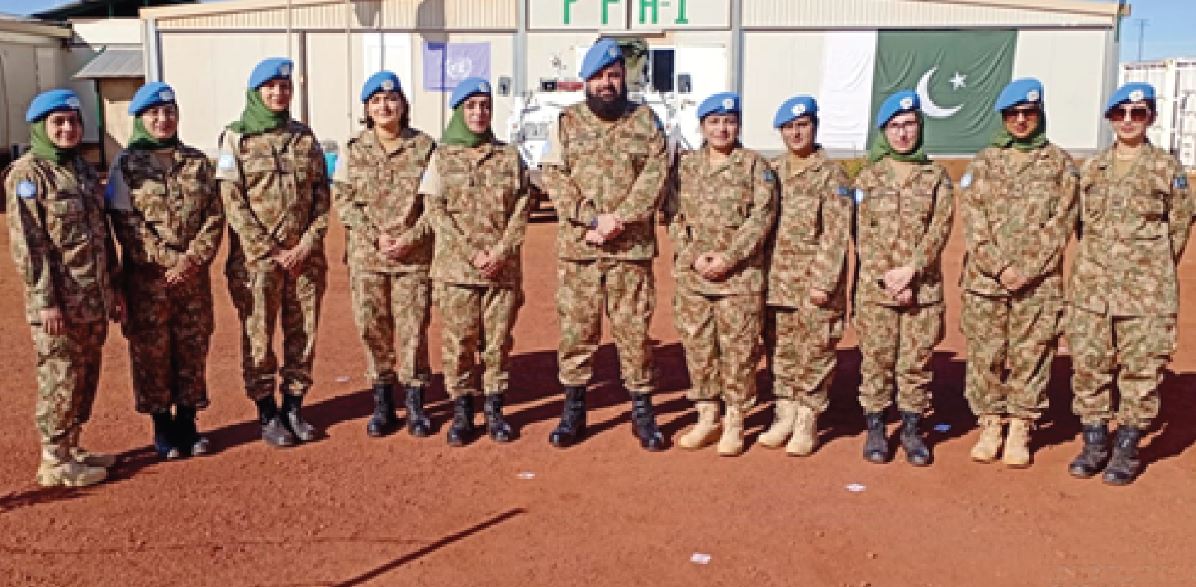
While I was mired in my routine practice of seeing patients in CMH Chorr, located in a small beautiful garrison cum oasis in the desolate desert of Thar, a clerk from the administration came in knocking. He saluted me and quietly placed a letter on my desk, smiling widely. Suspicious, I asked him what it was, to which he answered in a cheerful tone, “Madam, you are going on UN mission to Mali.” At first I couldn’t place the location he mentioned and he recognized the look of utter confusion on my face. So, he congratulated me and left me alone to let sink in the ambivalent feelings of excitement and unknown fear. As soon as he left, I immediately scrolled my mobile to see where Mali lies on the world map. To my complete surprise, it was a place again in a desert and that too in the Sub-Saharan Africa–a place we had only read about in books, heard from our elders, and learnt about for our school exam purposes. I tore the envelope and took out the letter to reveal its contents. He was right! I was going on mission to a place called Mali, which strangely and contrarily to the place itself (as I would later find out), means ‘gardener’ in Urdu language.
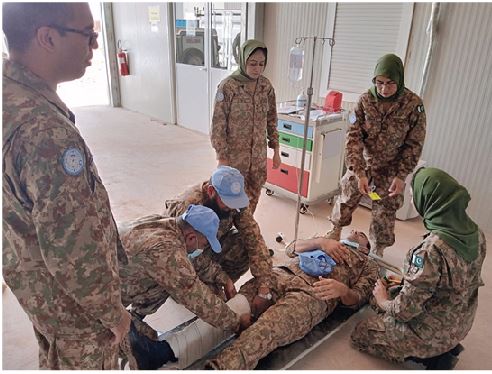
I, like all my peers attached with this mission, was attached to a Medical Battalion in Rawalpindi. Our task was to establish a Level-2 field hospital, Pak Field Hospital-1 (PFH-1), under the auspices of the United Nations (UN). The purpose of this hospital was to provide prompt medical and surgical services to UN troops entrusted with the peacekeeping purposes. After the requisite formalities at Rawalpindi, which took us around one month we were given the go-ahead to fly to Mali. During our stint at Rawalpindi, we made ourselves abreast with various contingency rehearsals like Causality Evacuation Exercise (CAS-EVAC). We also did spade work, anticipating all the medical equipment and medicines we might require in Mali, for which detailed lists were made after various comprehensive In-House Discussions (IHDs).
For any lady who has multifaceted roles be it of mother, wife or a daughter, it is incontrovertibly an emotional challenge to leave all her roles and affinities, and go to a distant land. All these indomitable iron ladies that were part of this team did that for the call of duty. Here I will share feelings of my colleague Lt Col Ambreen, who said: “At first, leaving my home and family was overwhelming but with the hurtful effect of this distance came a sense of enthusiasm and warmth with my new family in UN. We left in Pakistan our loved ones with their heads held up with honor and endless prayers for us as we were now about to represent our motherland at the international level.”
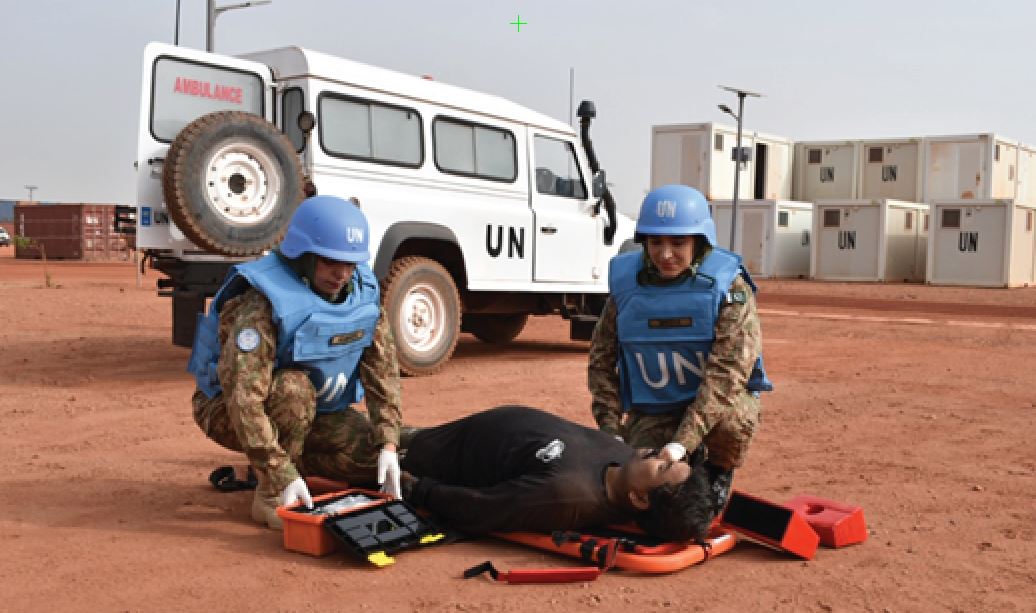
On landing in Mali at a semi-carpeted airstrip, a beautiful red desert tract welcomed us, with hot days and cold nights. We were awaited by the daunting task of establishing a complete hospital from scratch, that too in a foreign land with resource constraints and fragile security situation. Compounding these constraints was the time factor, as this gigantic task had to be completed in a meager one month and that too in an unpredictable weather of rainy storms alternating with merciless sunny days. The ground was all muddy and the air carried a mixture of dirt and moisture. My mission-mate, Maj Farhat Jabeen from Armed Forces Nursing Services (AFNS), shares and reflects the feelings and experience of us all lady officers: “I was a bit anxious and confused because working in a totally different environment of a foreign country was expected to be difficult. But because of my team, and especially lady officers, I built up my confidence to work in such an environment. Every team member remained very caring, cooperative and supportive.”
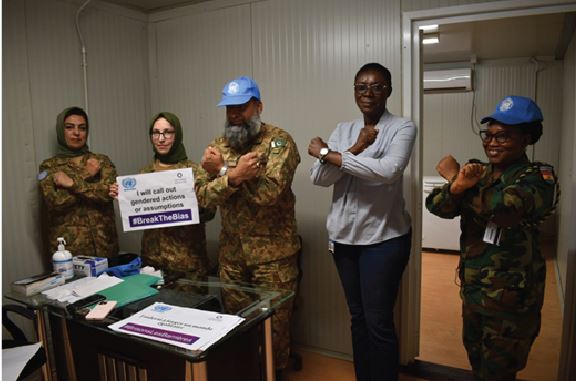
Our team constituted of eleven lady officers and nursing staff along with twelve male counterparts from various specialties. This spirited team burnt midnight oil to materialize the task at hand. We designed the complete hospital out of well-erected containers, assembled strategically by the Pakistan Army Sappers. These Pakistan Army engineers were there to assist us in designing the containers’ city, which was to be our abode for the rest of our stint at Mali. Apart from the various containers earmarked as residence, washing area and officers’ mess, there was a bunker surrounded by HESCO bags. We were told that incase of any rocket or fire raid, sirens would be hooted and we all had to assemble in the safety of this bunker. We didn’t know then that we would actually be using it in times of severe threat and hostile situations later why is this bigger.
To start with the task at hand, we organized ourselves into teams and established various departments including medical, pathology, radiology, operation theaters, triage rooms and ancillaries. The raising process of PFH-1 has been very aptly described by Maj Saira Mehboob: “All our efforts came to reality in the form of a state of the art Operation Theatre (OT) complex and Intensive Care Module (ICU) with slight innovations. As a famous quote says; There is no secret to success, it is the result of preparation, hard work and learning from failure. Our resolve from the word ‘Go’ was to set up a hospital that can provide quality care to critically ill medical and surgical patients according to latest guidelines.”
In the morning we were busy establishing the hospital, and in the evening we mired ourselves in activities that made us forget all the tiredness of work. Another colleague, AFNS Capt Sadia Irum recalls her time on the mission: “Apart from hospital routine, in the evening we strolled and some jogged in the perimeter of the camp, went to gym to tone up our muscles, and played badminton. We celebrated each and every moment, so that it became a cherished memory. Like on movie nights, we baked cakes, made desserts with coffee. All of us ladies used to get together to ward off the loneliness and homesickness we felt in the dark of the night. As pioneers in this mission, by making untiring efforts and struggles we have paved the way for subsequent missions by giving them a well-established platform in the form of Pak Field Hospital.”
Foundation of PFH-1 Mali is not only a great contribution but it also materialized in a great way. The dedication, commitment in establishing of this outfit from the beginning demands its share of applause for the team of this hospital. This hospital is not only an impetus of hope for troops deployed in the sacred task of peacekeeping, but also an ambassador of Pakistan. The role it played in handling the casualties and routine patients not only reflect professional acumen of Pakistan Army doctors but also accentuated the goodwill for Pakistan. During the period, various patients hailing from different cultures and ethnicities came to seek medical care. They were impressed immensely by the hospitable nature and professional dedication of the Pakistani team. So much so, that a few of them even promised to come to Pakistan to see for themselves what the place that boasted citizens like us looked alike.

From Tharparkar To Sub–Sahara
Maj Dr Farah Bilal recounts the challenges, joy and pride of serving as a UN Peacekeeper While I was mired in my routine practice of seeing patients in CMH Chorr, located in a small beautiful garrison cum oasis in the desolate desert of Thar, a clerk from the administration came in...


